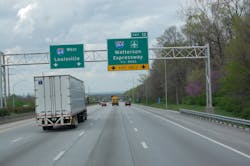While the 0.7% drop in truckload tonnage tracked by the American Trucking Associations (ATA) for May is disappointing – coming as it does on the heels of a 1.1% tonnage falloff in April – it is not altering the trade group’s positive freight forecast for 2012, or that of other experts, either.
“Annualized tonnage growth should be in the 3% to 3.9% range this year,” stressed Bob Costello, ATA’s chief economist, in a statement. However, he noted that two straight months of tonnage contractions “is disappointing,” pointing out that those drops in tonnage are reflective of a slowdown in the broader U.S. economy.
“The good news is that the decrease in fuel prices will help support retail sales going forward, which is a big part of truck tonnage,” Costello added.
As a negative, though, he expressed concern about businesses sitting on cash instead of hiring more workers or spending it on capital – both of which would give the economy and tonnage a shot in the arm – as they are worried about Europe’s financial health and the so-called “fiscal cliff” that awaits the U.S. at year’s end.
Other industry experts also echo Costello’s broad economic assessment. Rosalyn Wilson, senior business analysts with Declan Inc. and primary author of the annual State of Logistics report, noted that the U.S. economy continues to follow what she describes as a “slow, bumpy growth path” with freight volumes subjected to ups and downs as a result.
The U.S. GDP [gross domestic product] growth rate slowed to 1.7% in 2011, well below the 2.8% growth rate in 2010, [and] things have not been especially robust in the first half of 2012,” she explained during the presentation of the 23rdannual edition of the State of Logistics report last week.
“However there are enough signs of improvement that economy really does seem on its way up,” Wilson stressed. “But just like the beginning of this ride, we are going to experience bumps and setbacks along the way.”
She specifically noted that transportation costs were up 6.2% in 2011 – meaning carriers across all modes witnessed a significant jump in revenues, though largely as a result of higher rates and not increased volumes.
Trucking was more in control of rates in 2011 as trucking revenues went up 6.2% overall in 2011, Wilson said, with the intercity truck segment up 6.9% and the local delivery segment up 4.7%. Rates increased between 5% and 15% percent across the industry, with larger companies tending to be on the high side of the rate increases while smaller companies were on the low side, she added.
However, Wilson noted that U.S. manufacturing has currently slowed but not stalled, while new orders have been picking up. Industrial output has been stuck for a couple of months, she added, but inched up in May. However, consumer confidence – which had been climbing – has dropped for the last three months.
“The longer the recovery takes without solid sustainable economic growth, the more reticent businesses become about hiring and investment,” Wilson cautioned.
Bill Witte, principle of Witte Economics and chief economist for FTR Associates, chimed in as well last week during a conference call with reporters, emphasizing that the U.S. economy continues to follow a “sluggish” recovery pattern, with gross domestic product (GDP) growth rates only reaching 1.9% in the first quarter this year.
Business investment is also in decline, with a 3% to 4% rate projected for the next year and a half as opposed to the 11% and 8% investment levels attained in 2010 and 2011, respectively.
Thus, FTR’s economic outlook for the U.S. is “a little more pessimistic, with more downside risk” for 2012, Witte said, with annual GDP growth predicted to be between 2.3% and 2.4%, versus previous expectations of 2.5%.
Yet Noel Perry, senior consultant with FTR and principal of consulting firm Transport Fundamentals, noted on the same call that freight should continue to do well despite the “sluggish” U.S. economy – indeed, despite the economic tremors emanating from Europe as well.
“The freight world is not as bad as the broader economy – in fact, going forward, we will not see a proportional decline in freight because the U.S. economy is more manufacturing oriented now,” he explained.
Perry stressed that while the rate of long-term U.S. economic growth is slowing significantly – falling to 2.2% to 2.5% for the period between 2010 and 2020, versus the 3.4% achieved between 1983 and 2007 – freight volumes should continue to grow, albeit at a much slower pace.
“We haven’t made up the drop from the 2007 freight peak in terms of TL tonnage yet – we’re maybe only recovered 45% of the previous peak,” Perry said. “But our base case trucking forecast still calls for moderate growth, and the industry should still see relatively good freight numbers for the next two years.”
About the Author
Sean Kilcarr
Editor in Chief
Sean Kilcarr is a former longtime FleetOwner senior editor who wrote for the publication from 2000 to 2018. He served as editor-in-chief from 2017 to 2018.
